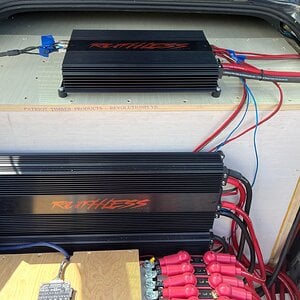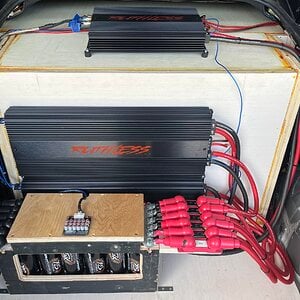You are using an out of date browser. It may not display this or other websites correctly.
You should upgrade or use an alternative browser.
You should upgrade or use an alternative browser.
-
16Participant count
-
Participant list
tc300 10+ year member
CarAudio.com Veteran
Temco or electron beam welding wire are great..... Do you have the 3.8 series 2 motor in that lumina ???I'm looking to perform the "Big 3 Upgrade" on my 1999 Chevy Lumina and I'm wondering what are good but inexpensive 1/0 gauge wires for this? Brand suggestions would be nice and if you've had any experience with them. Also, if I already have a fuse for my amp wiring, will I need another one for the Big 3?
Thanks!
LosIsATool 5,000+ posts
CarAudio.com Veteran
massivespl
Banned
All this fuse talk. Lol only thing I fuse is battery bank to amps. I never burned anything up. Why spend all this money on nice thick wire and then put little dinky fuses in the way. Fuses are over rated.
LosIsATool 5,000+ posts
CarAudio.com Veteran
I only fuse where the battery can arch and catch fire. A fuse won't save the amp from blowing. I could burp my old 2500 on 35 amps and it held most of the time on 30 second drive by runs. That should tell you something.
Distribution blocks are different than stacking multiple fuses. You may be correct, as I said, stacking fuses is unfamiliar to me and something about it really doesn't seem ideal. I'm open to learning new things though, if you have any material that I can reference that proves/disproves stacking fuses as a safe effective way to increase the amperage rating please enlighten me.
adulbrich 5,000+ posts
Olive oil un-virginer
Thank you!Jarod, Mitchell...
Your hypotheses are totally unfounded in anything relating to fact.
Using a pair of fuses in parallel would be no better or worse than using one.
Look at fused d-blocks for example. If you're using two different sized fuses does the lower current side get choked for power? No.
So one fuse has maybe 1% more resistance. So? It would blow at 1% less current. It's not like it would for some unknown reason just resist all current flow leaving the other fuse to try to pass it all.
You don't need to understand ANY physics theory to understand this. Just use some common sense.
Totally baseless.
Move on.
Only person who said that is massivespl, because he never got his. I've used knu, and sky high. Sky high is bigger.I heard that you should avoid skyhigh cable, knu is the way to go
I fuse between the bank and amps, and also between my alt and battery bank. The alt to battery bank is in case my alt malfunctions, so the bank is not over-charged.All this fuse talk. Lol only thing I fuse is battery bank to amps. I never burned anything up. Why spend all this money on nice thick wire and then put little dinky fuses in the way. Fuses are over rated.
Common sense and first hand experience is my source.Distribution blocks are different than stacking multiple fuses. You may be correct, as I said, stacking fuses is unfamiliar to me and something about it really doesn't seem ideal. I'm open to learning new things though, if you have any material that I can reference that proves/disproves stacking fuses as a safe effective way to increase the amperage rating please enlighten me.
Wild guessing is yours..
JarodM
Member
you're right in that it would be "no better or no worse than using one" all I'm trying to get across is that if you need a 500A fuse, get a 500A fuse. Simply stacking (2) 250A fuses will not give you a 500A fuse. one is going to blow before the other, then the second one after that, both well below the 500A threshold you're trying to accomplish. just because someone does something and it hasn't failed yet, doesn't make it the right way to do it.Jarod, Mitchell...
Your hypotheses are totally unfounded in anything relating to fact.
Using a pair of fuses in parallel would be no better or worse than using one.
Look at fused d-blocks for example. If you're using two different sized fuses does the lower current side get choked for power? No.
So one fuse has maybe 1% more resistance. So? It would blow at 1% less current. It's not like it would for some unknown reason just resist all current flow leaving the other fuse to try to pass it all.
You don't need to understand ANY physics theory to understand this. Just use some common sense.
Totally baseless.
Move on.
BassAndBeer
CarAudio.com Elite
ive heard that from more than one person though, so.. idk ive never owned it. just kinda unsure weather to get some or not.
n2audio 5,000+ posts
OPTIDRIVEN
I believe I thought of an example you may accept as "proof"...Distribution blocks are different than stacking multiple fuses. You may be correct, as I said, stacking fuses is unfamiliar to me and something about it really doesn't seem ideal. I'm open to learning new things though, if you have any material that I can reference that proves/disproves stacking fuses as a safe effective way to increase the amperage rating please enlighten me.
Fuse protection on an amp with multiple fuses.
How do you think those are wired?
About every major manufacturer seems to believe multiple fuses are an acceptable form of protection.
adulbrich 5,000+ posts
Olive oil un-virginer
Good luck getting 500 amp fuses cheapyou're right in that it would be "no better or no worse than using one" all I'm trying to get across is that if you need a 500A fuse, get a 500A fuse. Simply stacking (2) 250A fuses will not give you a 500A fuse. one is going to blow before the other, then the second one after that, both well below the 500A threshold you're trying to accomplish. just because someone does something and it hasn't failed yet, doesn't make it the right way to do it.
What have they said is bad?ive heard that from more than one person though, so.. idk ive never owned it. just kinda unsure weather to get some or not.
---------- Post added at 09:32 AM ---------- Previous post was at 09:32 AM ----------
Yes, my ampere 4 channel has three 30 amp fuses, not one 90 amp fuseI believe I thought of an example you may accept as "proof"...
Fuse protection on an amp with multiple fuses.
How do you think those are wired?
About every major manufacturer seems to believe multiple fuses are an acceptable form of protection.
JarodM
Member
Amazon.com $17.40.Good luck getting 500 amp fuses cheap
What have they said is bad?
---------- Post added at 09:32 AM ---------- Previous post was at 09:32 AM ----------
Yes, my ampere 4 channel has three 30 amp fuses, not one 90 amp fuse
adulbrich 5,000+ posts
Olive oil un-virginer
That's not bad, but a few 300 amp fuses are cheaper. Also, I would need 600 amp fuses for the 2/0 OFCAmazon.com $17.40.
Okay say you're right, I always appreciate an intelligent discussion. Here's where I find a problem with it, you mentioned that a fuse may have 1% more resistance than another, maybe that's not a lot or enough to make a difference but if you think about it and how electricity flows you should know that it's not a direct relationship. A 1% increase in resistance does change the way electricity flows. Remember that it follows the EASIEST path to follow, our fuse with less resistance. This means that electricity will first follow our fuse with less resistance, and yes it will carry more current at any time than our other fuse with more resistance. This means (in theory) that our less resistible fuse will carry the majority of the capacity until its resistance increases enough to cause the current to flow into the second fuse (if the first fuse heats up, saturates, or most likely, blows). Then you have one fuse blown and a second fuse that's half the rating of what you need and it blows immediately. You can't dispute that the resistance is going to cause one fuse to carry more current than the other, but you can dispute whether or not that would cause a premature failure of one fusee before another. That is what I want to know, and although your analogy makes sense there are a lot of different variables when it comes to running fuses in parallel on a circuit board and I am not an electrical engineer.
adulbrich 5,000+ posts
Olive oil un-virginer
Electricity will flow through both.Okay say you're right, I always appreciate an intelligent discussion. Here's where I find a problem with it, you mentioned that a fuse may have 1% more resistance than another, maybe that's not a lot or enough to make a difference but if you think about it and how electricity flows you should know that it's not a direct relationship. A 1% increase in resistance does change the way electricity flows. Remember that it follows the EASIEST path to follow, our fuse with less resistance. This means that electricity will first follow our fuse with less resistance, and yes it will carry more current at any time than our other fuse with more resistance. This means (in theory) that our less resistible fuse will carry the majority of the capacity until its resistance increases enough to cause the current to flow into the second fuse (if the first fuse heats up, saturates, or most likely, blows). Then you have one fuse blown and a second fuse that's half the rating of what you need and it blows immediately. You can't dispute that the resistance is going to cause one fuse to carry more current than the other, but you can dispute whether or not that would cause a premature failure of one fusee before another. That is what I want to know, and although your analogy makes sense there are a lot of different variables when it comes to running fuses in parallel on a circuit board and I am not an electrical engineer.
You see cars with 10 runs of zero gauge to the back. Do you think that electricity is only flowing through one wire at a time??
Activity
No one is currently typing a reply...
Similar threads
Nope, just purchased and received it for my brothers "74" Ford Currier truck resto build. Small 4 cahnnel taramps and a set of nice 6.5" Pioneer Z...
- 12
- 1K
This Kit that I recommended earlier has them in there
- Started by JohnPD
- Wiring, Electrical & Installation
- 10
- 1K
- Locked
Sorry just read the full thread lol
- Started by SnoringDad
- Car Audio Classifieds
- 4
- 2K
Lmao I can't with you pop
- Started by Drifter mike
- Wiring, Electrical & Installation
- 10
- 3K
I ran 1200 watts through 12 gauge. Didn't notice any melting on the wire's insulation.
- Started by Aryan
- Wiring, Electrical & Installation
- 6
- 486
About this thread
- Start date
- Participants
- Who Replied
- Replies
- 71
- Views
- 3,760
- Last reply date
- Last reply from
- BassAndBeer
Latest topics
-
OFC vs CCA for wiring amp to car and for speaker use . . .
- Started by kanihoncho
- Replies: 2
-
Suggestions on 6 channel amp/powering 3 way active front stage and driver selection.
- Started by JoeMama541
- Replies: 3
-
suggestion of which Butyl Automotive Sound Deadener Mat?
- Started by slater
- Replies: 8
-
-
Question about connections between head unit (HU), amp, and sub
- Started by kanihoncho
- Replies: 3


